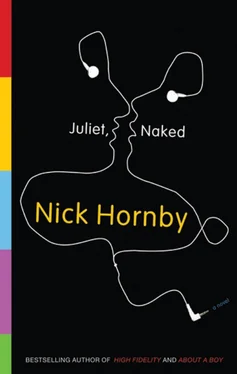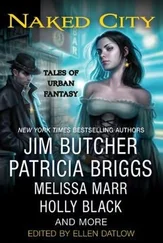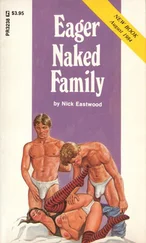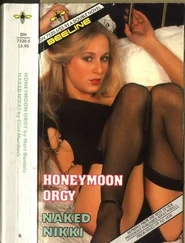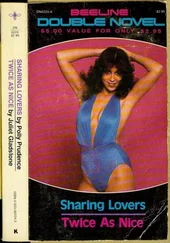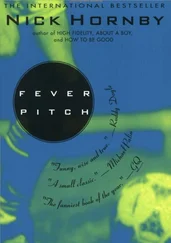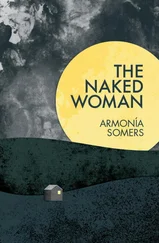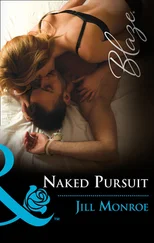On the way to Tucker’s room, she saw Jackson walking toward her, hand in hand with an impossibly glamorous but intimidatingly sulky woman in her late forties. Annie tried to smile at her, but she could feel the smile bounce off the woman’s face: Natalie, if that’s who the woman was, clearly didn’t dish out smiles for no reason, thus devaluing their currency. Annie was glad she had resisted the temptation to introduce herself; she’d have been like one of those crazy women who shout at soap-opera stars on the street because they think they know them. Just because Jackson spent his life stuck to her fridge didn’t mean that she could run up to him and frighten him half to death. As they walked past, she could see that he looked frightened enough as it was, and Annie hoped that didn’t mean she was walking into a room containing a very sick man. Supposing Tucker died when she was in there? And his last words were “Oh, I’ve read all those.” She’d have to make something up. And she’d never had to deal with a dying person. And it would be grotesquely inappropriate, hers being the last face he saw. Perhaps she should just go home. Or wait until she was sure there was somebody else in there, somebody he actually knew.
But then she was knocking on the door and he was saying, “Come in,” and before she knew it she was sitting on his bed, and they were beaming at each other.
“I bought you some books,” she said, much too soon. The books should have been an afterthought, not an introduction.
“I’m sorry,” he said. “I meant to say I’d pay you back. I don’t know you well enough to ask you to spend money on me.”
She’d asked for that by coming in and yelling about her kindness. Idiot.
“Good grief, I don’t need paying back. I just didn’t want you to think I’d forgotten. Terrible, being in hospital with nothing to read.”
He nodded at his bedside table. “I still have old Barnaby. But he’s not as much fun as I’d hoped. You read that one?”
“Ummm…” Oh, come on, woman, she told herself. You know the answer to the question. You’ve read about four Dickens novels, and that’s not one of them. Barnaby Rudge isn’t going to be a deal breaker. On the other hand, why take the risk?
“I’m like you,” she said brightly. “I got about a third of the way through and put it down. Anyway. You’ve had a heart attack, and we’re talking about me not finishing a book. How are you?”
“Not so bad.”
“Really?”
“Yeah. Tired. A little anxious about Jackson.”
“I think I saw him walking down the corridor.”
“Yeah. Natalie’s taken him to a toy store. It’s all too weird.”
“They’d never met before this trip?”
“Shit, no.” She laughed at his eyes widening in alarm. “Why would I do that to him? And I want him to look up to me. I don’t want him judging me on the basis of my past mistakes.”
“But she’s being nice to him.”
“Yeah. I guess. And me. Her old man paid for us to fly over here. And then I keel over in the reception of the fan ciest hospital in London, so he gets to pay for that, too.”
He laughed wheezily.
“So she’s not all that bad.”
“Apparently not. Now I find out.”
“How did you end up married to an Englishwoman?”
“Ohhhh…” And he waved a hand, as if a wife from another continent were inevitable at some stage in the career of a serial husband, and the details were therefore wearyingly inconsequential.
She told herself not to ask too many questions, even though there was so much she wanted to know about him. She liked to think she was curious about people, but her hunger for information went beyond curiosity: she wanted to piece the entirety of his adult life together and she seemed to be lacking even the straight edges that would get her started. Why did she care so much? Part of it was because of Duncan, of course: she was thinking with his fan’s head and she felt obliged to collect as much information as she could, because nobody else was in a position to do so. But it wasn’t just that. She’d never been given the opportunity to meet someone this exotic, and she feared she’d never be given it again, unless some other vanished bohemian contacted her out of the blue.
“Ah,” she said. “One of those.”
“Did that seem as if I’m being mysterious?” he said.
“It seemed as though you weren’t feeling up to talking about the marriage before last to someone you’ve only just met.”
“Perfect. Amazing what you can do with the limp flap of a wrist.”
“How’s your daughter doing?”
“Not so great. Okay physically, but angry. Angry with me, too.”
“With you?”
“I’ve gone and fucked it all up for her again. For once, she was supposed to be the center of attention.”
“I’m sure that’s not what she means.”
In the first five minutes, she had defended both Lizzie and Natalie, and she vowed not to say anything nice about anybody related to Tucker for the remainder of the visit. It made her sound bland and boring and good and exactly the sort of person that a reclusive cult musician in recovery wouldn’t like, if she knew anything about reclusive cult musicians in recovery, which she didn’t. And in any case, there was every chance that these people were horrible. She’d only seen Natalie for two seconds in the hallway, but those two seconds had been salutary: they suggested to her that the rich and beautiful really were different. “I’m sure that’s not what she means…” How would she know what the daughter of a model meant?
“Do you know many people in London?”
“Nope. Lizzie and Nat. And you, now that you’re in London.”
“So you haven’t been bombarded with visitors?”
“Not yet. But I understand there are a fair few on the way.”
“Really?”
“Really. Nat and Lizzie decided in their wisdom that my children should all come here to see me before I croak. So I’ve got three more kids and another ex-wife on the way.”
“Oh. And how do you feel… ?”
“I don’t care for the idea much.”
“No. Well. I can see that.”
“The truth is, Annie, I’m not going to be able to go through with it. I’m going to need you to get me out of here. If you live in a small seaside town a ways away from this hospital, then that sounds like exactly the sort of place I need to rest up in. Might be fun for Jackson, too.”
For a moment, Annie forgot to breathe. She had written that last sentence for him several times since he’d called to tell her what had happened, although it sounded better in his voice, of course, and there were some linguistic details that she’d never have come up with: “a ways away,” “rest up.” And then, after she had started inhaling and exhaling again, with a little more noise than she might have wished, she started thinking about train times. She’d been intending to get the two-twelve, unless she’d been given a compelling or even a mildly plausible reason to stay in London; if Jackson came back from the toy store in time, they could jump in a cab to King’s Cross and be back in Gooleness by four-thirty.
“What do you think?” She’d not only forgotten to breathe; she’d forgotten that she was supposed to be taking part in a conversation with a real person.
“I don’t think Jackson would have much fun. It’s not such a fun place, especially this time of year.”
“You still got that shark’s eye?”
“I have loads of pieces of shark.”
“Well, that’s a happy afternoon right there.”
The trouble was, she couldn’t help but be boring and bland and sensible and good. There was nothing she wanted more than to nurse Tucker back to health in Gooleness, yet the desire was untrustworthy, and dangerously, self-indulgently whimsical: it was the crush talking. For a start, he’d had a heart attack, not a bout of flu. He probably didn’t need blankets and hot-water bottles and homemade soup; for all she knew, any of those things might kill him. And stealing him away from his family, it seemed to her, would be wrong and bad and none of her business; she tried not to think conventionally, but she probably did believe that families were important, that fathers had a duty to their children, that Tucker couldn’t just run away from them out of fear or embarrassment or both. All of these doubts, when she examined them, started to lead to the unwelcome conclusion that Tucker was a real person, with actual problems, and neither he nor the problems could comfortably be accommodated in her life, or in her house, or in Gooleness. If that was where doubts led, then she didn’t especially want to follow them.
Читать дальше
